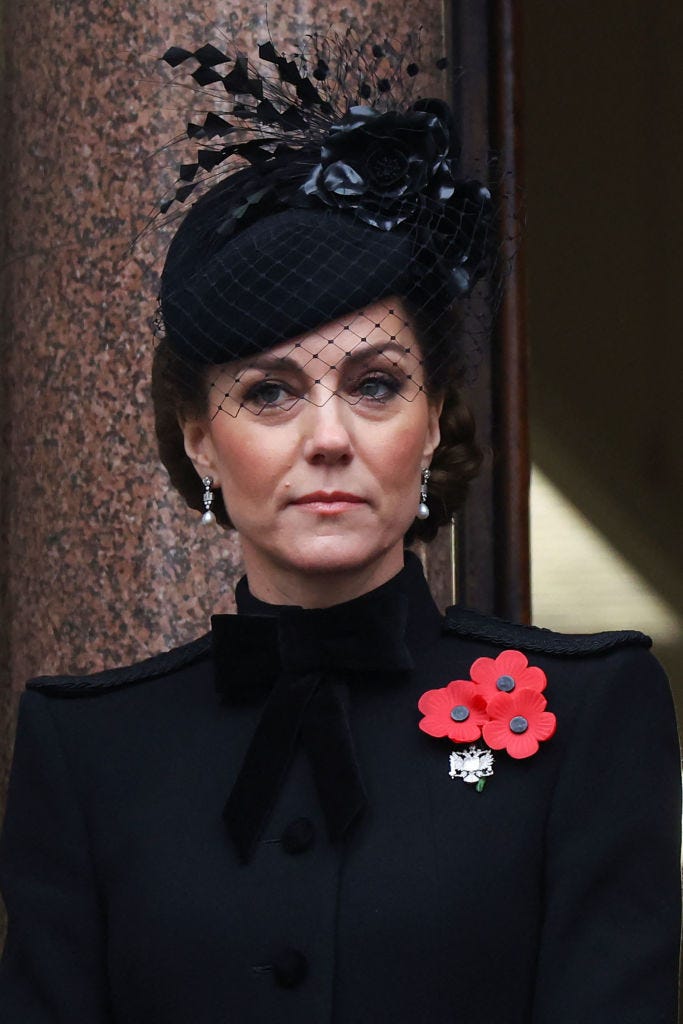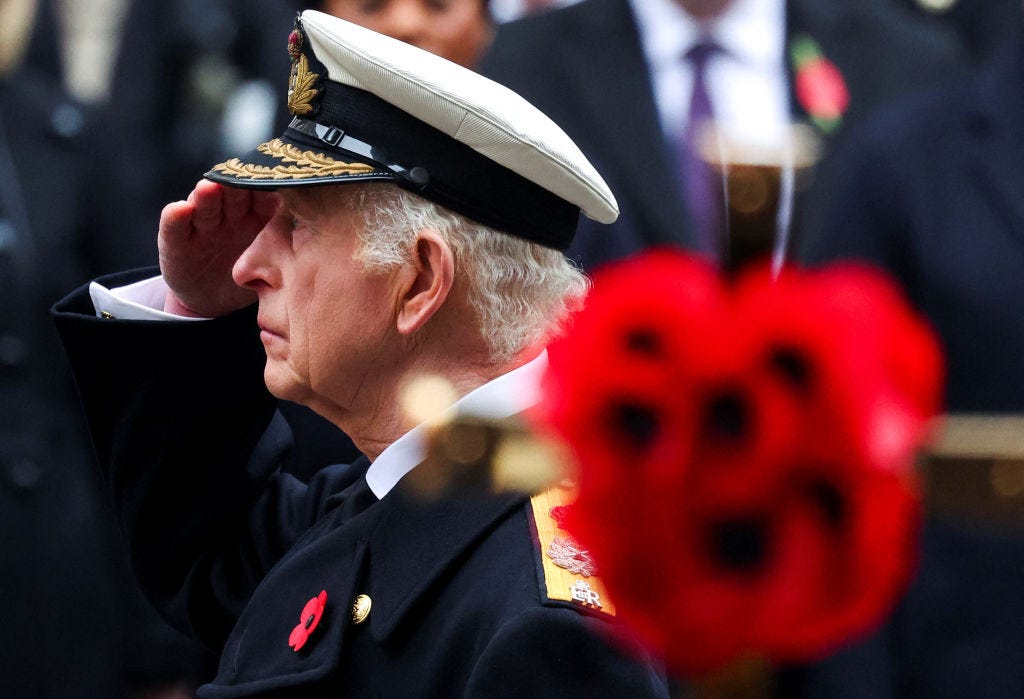Military Matters and Royal Feuds
William, whatever his abiding resentments toward Harry, should now suck it up and let his father give Harry something to do.
Fled to London Saturday night for some post-election air only to realize I had woken up on Remembrance Sunday. I arrive at the BBC for a panel on Laura Kuenssberg’s morning politics show, alongside Lord Andrew Roberts, the historian, and Lord Peter Mandelson, the former Blair government luminary. In the green room, a poppy is pinned on my lapel in memory of the more than one million UK soldiers killed since the onset of WWI. All the military gravitas feels nostalgic given that the British army is now at its smallest size since the Napoleonic wars. We are not honoring the dead from past wars, says Lord Roberts, by under-arming British servicemen and women for the next one. All Trump's early moves indicate the US is about to sell Zelensky down the river and NATO will have to step up its contributions but Lord Roberts’ shock fact of the day: the UK only has two-and-a-half days’ supply of 155-millimeter caliber shells if they were fired at the same rate as the Russians and Ukrainians are firing them at each other.
Holy crap! The next British ambassador will have to be able to punch above the UK’s puny weight to get any face time with the führer. As it is, Americans, who love everything supersized, have never understood why the UK elected to make itself smaller with Brexit and remove itself from a seat at the European table. Labour PM Keir Starmer’s dour August speech about the “rubble and ruin” left by the Tory party’s 14 chaotic years in office did not do much to emboss a new ambassador’s calling card. That's why it makes sense for my co-panelist Mandelson, also in the running to be Chancellor of Oxford (a ceremonial job, as he keeps pointing out, that could be performed simultaneously with being British ambassador), to follow the much admired Dame Karen Pierce in Washington. Mandelson is a sinuous and seasoned enough diplomat bristling with clever 21st-century trade ideas. He has the sophistication to operate in a new Trumpian world where the only “special relationships” are with kleptocrat dictators and the president-elect regards the UK as a distressed asset with an awful lot of royal real estate.
A Harry-Sized Hole
It's impossible to watch the coverage of the Remembrance ceremony at the Cenotaph war memorial on Whitehall without thinking of the late Queen Elizabeth who, until she ceded the responsibility to Prince Charles in 2017, considered the November occasion the most sacred and unmissable of her royal duties. For Elizabeth, military service was anything but an ornamental necessity. The Second World War was fundamental to her notion of duty and the values to which she dedicated her life. As we increasingly drown in oafish rhetoric and blathering influencers, her superpower was never letting us know what she thought. Her restraint came to symbolize the British nation at its most eloquent.
It was cheering and moving to see the valiant Princess of Wales gracing the Foreign Office balcony, healthy enough since her cancer ordeal for us all to adulate her appropriately severe, structured black coat dress and hair twisted into an impeccable chignon under a charming netted fascinator. The only upside of her long convalescence must have been a respite from the searing spotlight. Tabloid lip readers caught her saying to Prince Edward’s wife, Sophie, “You’re never quite ready for this, are you?”
Despite the passing of years, there is still a gaping Harry-shaped hole in the depleted royal line-up. As a veteran of two military tours in Afghanistan and founder of Invictus, the substantive charity that brings hope through competitive sports events for injured vets, the Duke of Sussex, now stripped of his military honors, surely deserved a place on the balcony. The British nation needs his human touch and so does his ailing father. Prince William just acknowledged that this past year’s scourge of family illness, when his father and wife fell mortally ill at the same time, has been “brutal.” But the other prince who could plausibly lighten the load is still benched in Montecito.
At the Cenotaph, the king looked old and bleak without the usual supportive presence of Camilla who now, alarmingly, is herself unwell with a chest infection. Charles has just lost the siege to eject his disgraced brother Andrew from the money-pit mansion Royal Lodge on the grounds of Windsor where he remains shacked up with his horse and his ex-wife. The house was bequeathed to Andrew on a 75-year lease by his grandmother and there was never a legal leg to stand on to get him out. For Charles, it was an unwinnable fiasco.
William did not help the mood by giving a swaggery interview at the end of his South Africa trip for the Earthshot Prize. He told reporters about his plans to “do things differently” and then listed “impact philanthropy, collaboration, convening, and helping people”—in short, everything his father has been doing for the past 50 years.
“I’m doing it with maybe a smaller ‘r’ in the royal,” he added, an unfortunate choice of words after the Sunday Times revealed days before that William’s and Charles’ ancient Duchies of Cornwall and Lancaster are worth an eye-watering £1.8 billion and hold 5,000 properties on 180,000 acres (seized in the centuries after the effing Norman Conquest). They rake in this haul, reported the Sunday Times, by charging for the right to cross rivers, offload cargo onto the shore, run cables under their beaches, operate schools and charities, dig graves, and also charge for the use of toll bridges, ferries, sewage pipes, churches, village halls, pubs, distilleries, gas pipelines, boat moorings, car parks, rental homes, and wind turbines. The king even collects rent from the NHS for an ambulance warehouse.
In light of all this, William’s comment that his plans for a caring, sharing monarchy also include “throw(ing) some empathy in there” made him sound like a performative pinhead. In happier years, it was the irreverent Harry (or Harold as William lugubriously used to call him) who could tease the Prince of Wales and take him down a peg. There are too many people around William now who, in Kara Swisher’s inimitable phrase about those who live in a gilded bubble, “lick him up and down all day.”
But are things about to change? I am told by an intimate royal source that Sir Clive Alderton, the king’s all-powerful private secretary and gatekeeper, and an avowed Harry enemy, –caricatured by him as The Wasp in the explosive pages of his memoir Spare – is considering retirement. The royals are run, to a degree the public doesn't often realize, by their private secretaries, able to block and tackle the access of people on their personal shit lists. Harry characterized this tribe as “insects who buzz around the Palace” and “have a sting in their tail.” If Alderton goes, it could create a new, friendlier path for negotiations with Harry to be given the security protection he seeks and to resume some curtailed version of his royal duties. It could also represent a great face-saver for Meghan who must realize by now that the dull demands of second-division royalty are less onerous than grinding out serial rebranding flops.
Enough with the feuds. Families, including this one, need to stick together. William, whatever his abiding resentments toward Harry for his intemperate broadsides in Spare, should now suck it up and let his father give Harry something to do. In an isolationist Trump world, the UK needs to draw closer to Europe and romance its relations with the Commonwealth. William and Kate dread foreign tours that take the princess away from the children and cut into what William (to his advisers' irritation) calls his “me time.” So, unload the lesser but important red-carpet junkets onto the Sussexes who, chastened by five years in the wilderness, would export some modern royal flair, especially to ex-colonial trouble spots. Uh, wasn’t that the original plan?
No one would have been happier about a rapprochement than Queen Elizabeth, who took a harsh position on Megxit, but in times of crisis evolved her positions, albeit at a glacial pace, as she did when she finally allowed Prince Charles to marry his mistress in 2005. What was always paramount for her was the health of the crown. And right now, the crown needs Harry.
I confess I started to blub as the king somberly laid the wreath on the Cenotaph and Big Ben chimed its toll over the two minutes of silent remembrance. Life is fragile and fraught with unpredictability. I missed again the small, indomitable figure of Queen Elizabeth II who always knew what she stood for and somehow, magically held her disintegrating country together, even as her feuding family fell apart.








So insightful. I wish the royal family could have you as an advisor. You probably could have helped the Democratic Party as well. People so often don’t see themselves clearly. Even if Harry doesn’t come back we must do something to get the Democrats back on their feet! Thank you for your clarity. It’s brisk but welcome!
Huh! Word trickling down through my three degrees of separation from D.C. is that while Trump is proposing blanket tariffs against the EU, he’s open to offering the UK tariff-free status—which would make the UK the only tariff-free route from Europe to the U.S. If that's true, the isolationist Trump regime stands to make Britain a staggering amount of money.